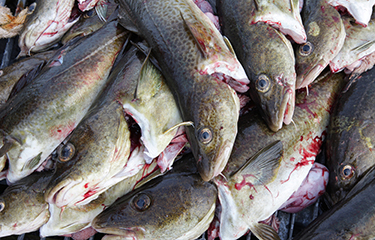The Marine Stewardship Council (MSC) has announced the suspension of the North Sea cod fishery certification due to stocks of the fishery dropping below safe biological levels.
The suspension comes after the latest scientific advice revealed that the stock – once thought in good health – appears to be in decline despite industry initiatives, such as avoiding catching juvenile fish that are critical to the reproduction cycle. The root cause of the decline is unclear, but scientists suggest that climate change could be an overarching cause.
“The MSC program was established to recognize and reward sustainable fisheries and is designed to identify when certified fisheries are not performing as they should against our standard,” Erin Priddle, U.K. and Ireland program director for the MSC, said in a release announcing the suspension. “The independent auditors have now examined the latest advice and concluded that this drop in the stock – below the safe biological level – coupled with a recommended sharp cut to quotas means that the North Sea cod fishery no longer meets the MSC standard.”
North Sea cod has had a tumultuous history as a stock, peaking at 270,000 MT tons in the 1970s, and falling to a historical low of 44,000 MT in 2006. In response to the falling stock, the fishing industry undertook a number of measures, including a comprehensive fisheries improvement project, that helped to rebuild it. The fishery was certified by the MSC in 2017, with the stock estimated at 152,207 MT.
Stocks were forecast to hit more than 180,000 MT in 2018, but an International Council for the Exploration of the Seas assessment showed a much lower estimate of only 81,224 MT. That difference is what has resulted in the MSC announcing the certification’s withdrawal as the allowable catch sits well above what would be considered sustainable based on the new estimates.
The announcement came at the same time as another by the MSC urging governments and the fishing industry to step up efforts to anticipate the effects climate change will have on fisheries. That request was spurred on by a landmark report by the Intergovernmental Panel on Climate Change, which took a close look at how climate change will affect the oceans.
“They’ve come in the habit of writing special reports with a special focus, and this is the first one on the cryosphere, the oceans,” Hans Nieuwenhuis, regional director for the Northern European region at the MSC, told SeafoodSource. “It’s the first time we’ll have a comprehensive picture of how climate change, through many many factors, is having an impact on the ocean.”
The report includes extensive details about how the current distributions of commercial seafood will shift as ocean temperatures change. As those populations move to follow warmer – or cooler – waters, many popular commercial species may end up leaving the fishing grounds they are currently in.
As those distributions shift, new countries that never had a viable commercial fishery of some species may suddenly be “seated at the table” when it comes to negotiating sustainable quotas between governments.
Nieuwenhuis pointed out that it’s not a hypothetical result of global climate change, but something that’s already happening, as is the case with the Northeast Atlantic mackerel fishery.
Independent auditors – which the MSC utilizes to conduct assessments to its standards – recently decided that the certifications of the Northeast Atlantic mackerel fishery will not be reinstated, even though the latest scientific advice shows that the stock is healthy. That determination was largely related to the lack of any international agreement on setting quotas.
“It’s an interesting illustration of how climate change is putting pressure on different government arrangements,” Nieuwenhuis said. “New players have come on board and acquired the status of coastal state. It means that you have to share the pie differently, and if you don’t manage to share the pie in some equitable way, if you don’t come to an agreement that’s acceptable to all, then you come to the situation that everyone does what they think is best for themselves.”
That situation can often result in the overall allowable catch being higher than what is sustainable for the stock, which can result in the withdrawal of MSC certification.
One of the big risks that the IPCC report looked at, according to Nieuwenhuis, is the potential changes to the thermohaline circulation of the ocean, particularly in the North Atlantic. One such current, commonly referred to as the Gulf Stream, is the reason why higher latitudes in Europe can enjoy milder, warmer weather than their North American counterparts.
“This is why we have a mild climate here, but this is also why we have the distribution of fish stocks that we have in the North Atlantic,” Nieuwenhuis said. “It [thermohaline] might actually slow down, the chance of it collapsing is considered to be very, very low, but they do consider how it is going to slow down.”
As that current slows down, the historical distributions of many species may shift, which will force governments and the industry to adapt.
The lesson that the MSC hopes countries pull from the IPCC report is that climate change is not an isolated incident, and being proactive will be the only way to ensure that fish stocks remain at sustainable levels. Current changes, like in North Sea cod and Northeast Atlantic mackerel, are not going to revert any time soon.
“Some hope it will go away. But it won’t go away, that’s the thing. You cannot expect the situation to change again in your favor a couple of years from now. This is a problem, not of just now, but it will remain a problem for the management of this fish stock, so you better deal with it now,” Nieuwenhuis said. “I hope its a wake-up call of those who think, 'It’s nature, it will change back.'"
Photo courtesy of Shutterstock







